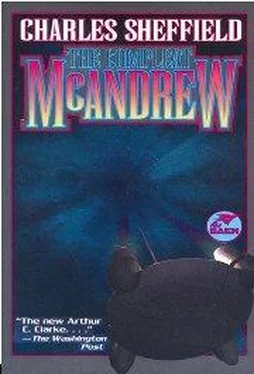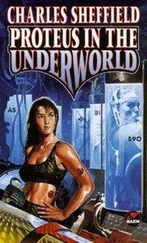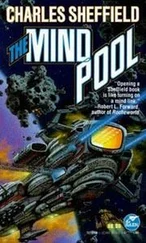The Compleat McAndrew
by Charles Sheffield
A glance at the copyright dates on the stories in this book shows that McAndrew has been with me for almost as long as I have been writing fiction. My own manuscript notes make that point even more clearly: the first piece of fiction that I ever published appeared in the April, 1977 issue of Galaxy magazine. The handwritten date on the first page of the manuscript of “Killing Vector,” my first McAndrew story, is just two months later: June 15, 1977. Since then, at apparently random intervals ranging from a few weeks to a few years, I have produced another tale of Arthur Morton McAndrew and his long-time and long-suffering companion, Jeanie Roker.
What’s the fascination of these characters for me, and why do I return to them again and again? As a related question, is there any pattern to the stories?
First, let me point out that the order in which they appear in this volume is not the order in which the stories were written. Chronologically, the order would be “Killing Vector,” “Moment of Inertia,” “All the Colors of the Vacuum,” “The Manna Hunt,” “Rogueworld,” “Shadow World,” “The Invariants of Nature,” “Out of Focus,” and “The Fifth Commandment.”
The most obvious point about these stories is that each revolves around some central issue of science. I go into that subject in detail in the Appendix at the end of the book. Whenever I become interested in something, especially when that something involves physics and astronomy, a McAndrew story is likely to emerge from my hindbrain.
That explains the chosen themes, but not McAndrew himself. I might suggest that he is some form of alter ego, the me that I wish I were, except that others have already assigned that role to Behrooz Wolf (of Sight of Proteus, Proteus Unbound , and Proteus in the Underworld ).
Of course, I may have an alter ego suffering from multiple personality disorder. However, my better guess is that McAndrew is an excuse . I derive great pleasure from sitting around, reading and calculating on matters of no earthly value and importance. I do this happily for hours and days, limited only by the arguments of conscience that I ought to be doing something useful and productive. To give one example, I have for the past five years tried, sporadically and unsuccessfully, to analyze a particular mathematical game. I can state the game simply, and to avoid (or possibly create) reader frustration I may as well do so. Two players, A and B, take turns throwing a die. There is a probability p that the die will show a score of 2, and a probability of (1 — p) that the die will show a score of 1. Given a whole number N, what is the probability that player A will be the first to reach a score of at least N?
I cannot justify wasting so much time on such a trivial game, except to use the all-work-and-no-play defense. However, if an area of apparently useless interest can one day become the basis for a McAndrew story, I have a rationale for my actions. Surely, if I write and publish a story, no one can say that all my preliminary reading and calculating was pointless.
As for an overall pattern to the stories, I do see a general trend. However, I suspect that the trend mirrors changes not in science but in me. If I had to categorize myself at the time I wrote “Killing Vector,” it would be as a practicing scientist whose knowledge of science fiction was mainly as a reader, a person who despite some first-hand experience of America and Americans was basically English, with an English wife and children. Today, twenty-one years and four or five million published words on, I would describe myself as a writer with a strong amateur interest in science; a person mostly American, with an American wife and children, albeit also a person with strong social and family ties to England and the English. And, a fact not to be dismissed, I am twenty-one years older. I am rather less interested in science, and more interested in people.
These changes affect the stories. When first we meet him, McAndrew the scientist is all there, but I don’t think I could in the early tales ever have given him a child (as in “Rogueworld”), and still less a mother (as in “The Fifth Commandment”). That last story also points out an implicit element in most of the earlier stories: the relationship between Jeanie Roker and McAndrew is in some ways that of parent-child. He is the small boy whose rash actions lead him into trouble, she is the responsible and experienced adult who gets him out. I think that’s who I would really like to be, the curious child who is not quite responsible for his own actions. That is the reason why I continue to write about Arthur Morton McAndrew.
Two other brief answers to questions: Will I ever write a McAndrew novel? An e-mail correspondent pointed out that although there are references to McAndrew in others of my novels, he has never had one of his own. My answer is, McAndrew will get a novel when I run across a neat scientific idea so large and complex that I can’t get a handle on it in a story of ten to twenty thousand words.
And finally, is this really the Complete McAndrew, as the title suggests?
To this, I can only offer the Clintonian reply: it all depends on how you define the word, is . Certainly, at this time there exist no other McAndrew stories, so what you have is the complete McAndrew. Equally certainly, there will in the future be fascinating scientific ideas that just jump up and down, crying out, “Me, me, write about me.”
I’m not sure I will be able to resist their pleas. But “The Incomplete McAndrew” makes a poor book title.
FIRST CHRONICLE: Killing Vector
Everyone on the Control Stage found a reason to be working aft when Yifter came on board. There was maximum security, of course, so no one could get really close without a good reason. Even so, we all took the best look that we could manage — you don’t often have a chance to see a man who has killed a billion people.
Bryson from the Planetary Coordinators’ Office was at Yifter’s elbow. The two men weren’t shackled or anything melodramatic like that. Past a certain level of notoriety, criminals are treated with some deference and even respect. Bryson and Yifter were talking together in a friendly way, although they were in the middle of a group of top-rank security men, all heavily armed and watchful.
They were taking safety to extremes. When I stepped forward to greet Bryson and his prisoner, two guards carefully frisked me before I could get within hand-kill range, and they stood close beside me when the introductions were made. I haven’t lived on Earth for a long time, and they must have known that I have no close relatives there; but they were taking no chances. Yifter was a prime target for personal revenge. A billion people leave a lot of friends and relatives.
From a distance of one meter, Yifter’s appearance did not match his reputation. He was of medium height, slightly built, with bushy, prematurely white hair and mild, sad eyes. He smiled at me in a tired, tolerant way as Bryson introduced us.
“I am sorry, Jeanie Roker,” he said. “Your ship will be filled with strangers on this trip. I’ll do my best to keep out of your way and let you do your job.”
I hoped he could live up to his words. Since I took over the runs to Titan, I’ve carried most things in the connected set of cargo spheres that make up the Assembly. Apart from the kernels, and we carry a few of those on the outbound leg of every trip, we’ve had livestock, mega-crystals, the gravity simulator, and the circus. That’s right, the circus. They must have had a terrible agent, that’s all I can say. I took them both ways, to Titan and back to L-5. Even with all that, Yifter was still a novelty item. After he had been caught and the rest of the Lucies had gone underground, nobody had known quite what to do with him. He was Earth’s hottest property, the natural target for a billion guns and knives. Until they decided how and when he would come to trial, they wanted him a long way from Earth. It was my job to deliver him to the Titan penal colony, and return him when they got themselves sorted out on Earth.
Читать дальше












